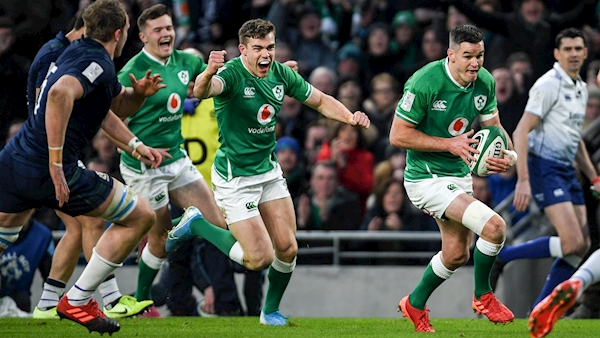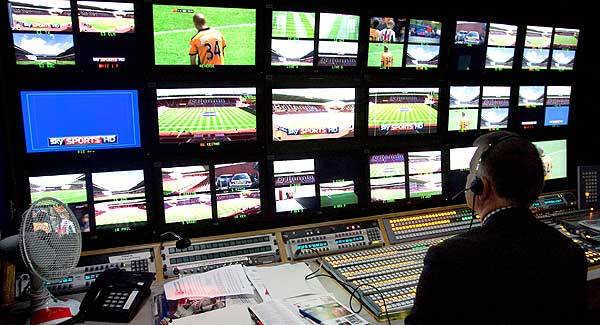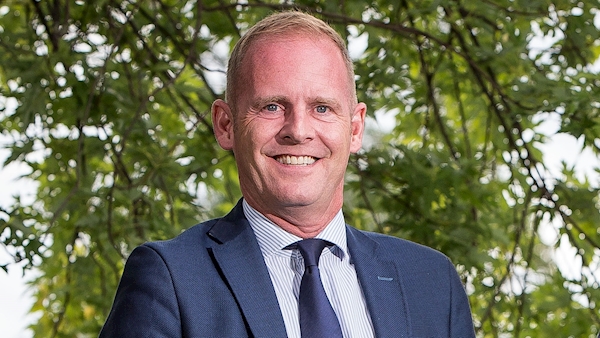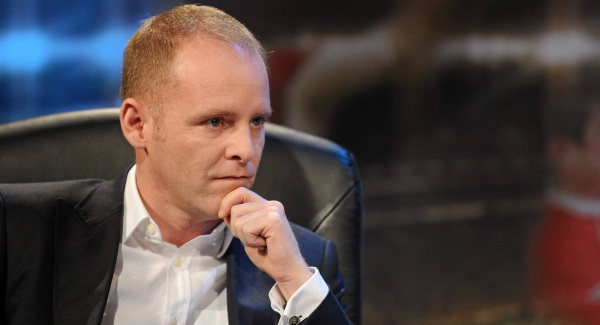By Michael Moynihan
You know the voice. Don’t pretend otherwise.
In his time at RTÉ Ryle Nugent doubled up. Head of sport during the week, rugby commentary duties on the weekend.
The latter commitment has been his focus in the two years since he left RTÉ, calling games for Channel 4 and BT. Enjoying the game-day experience.
But the expertise picked up while wearing that other hat meant people kept ringing, and not to discuss Munster-Leinster.
Heading the sports department of a national broadcaster sharpens skills not many people have, and Nugent was enlisted for a few different projects.
In the back of his head he was thinking, if he was working in that space anyway . ..
“The business was due to launch formally in the middle of March, but I held back for a week or two to get a sense of how the landscape was. I was thinking if I waited for a prevailing wind, the right time, I could be waiting six months.
“Then . . .”
Then the pandemic happened.
“Look, at least we saved money on premises. We’re all working from home.”
The business, Stakeholder Sport (stakeholdersport.com), has four pillars — federations, broadcasters and platforms, the commercial involvement of sponsors, and rights issues.
“We have different services involved with each pillar,” says Nugent, “Whether that’s strategy or the production of feeds — there’s so much going on in this area.
“People focus, understandably, on the big ticket items like the big field sports like soccer, rugby, and Gaelic games, but there’s a whole host of activity going on just beneath that level.”

What has he noticed that’s surprised him about the sports business industry in Ireland? The fact that it’s not confined to Ireland, maybe.
“Whether it’s a federation or a commercial sponsor or a broadcaster, that sense of it just being about Ireland no longer exists really.
“If you’re a small sports federation based here you’re still part of a wider, European or world federation that you report into; if you’re a broadcaster you’re as concerned with the UK market as you are with the Irish market; if you’re a sponsor like Vodafone or AIG then you have what’s going on in Ireland, but you’re also aware of the mother ship in the UK or further afield.
“Because of that we have experts in the UK and in France who’d have that intimate understanding of their own markets — in that way if we see something that might work in Ireland but we’re not sure how it’ll work further afield.
Bringing a slightly more global aspect is a requirement if it’s a requirement: if it’s not, then it’s not.
All of this comes with significant asterisk, of course, in the shape of the lockdown and the economic slowdown expected in its wake.
“If there’s a comparison here — though there isn’t really — I had the honour of being RTÉ’s head of sport when the financial crisis was coming to a head.
“Some very difficult situations arose, and we had some very difficult decisions to make about the strategy going forward.
“What’s key for the sports industry is that most of the contracts involved in that industry are not one-year deals, they’re two-, three- ,or four-year deals. So the decision you make now may not impact for two or three years.
“If you’re trying to save money and to make strategic decisions now, those will also likely have an impact in two or three years’ time as well.
“You’ve got to be very careful that you don’t make a decision to solve today’s problem that will cause a whole lot of other problems down the road.
“Those lessons were brought to bear through that crisis. We had a scenario where Noel Curran (then RTÉ Director General) made the decision at the time that he wanted 30% out of the sports budget in the next cycle.
“That decision meant hard calls had to be made and strategies put in place to deliver those savings.
“To draw a parallel, that’s the likely scenario facing commercial rights broadcasters and content platforms now when we return to whatever version of normality we return to.
The impact is massive and you can see that playing out at every level of the sports industry.
“It’s frightening and a challenge, but it’s also an opportunity. Whether you’re a federation, a broadcaster, a sponsor, you can ask yourself ‘Why are we in it? Is it what do we want to do?’
“And if not, how do you go about changing that?”
For example?
“Rugby has been talking about introducing a global season, and if ever there was a time to pause and give that serious consideration, it’s now. If the circumstances don’t suit that now, when would they suit it?
“Similarly with the GAA looking at restructuring its playing season. If this isn’t that time, when would it be?
“Those are easy things to say, though, because the implications are monumental — not just for federations, broadcasters and sponsors, but for players and fans.
“And that’s a group which needs to be part of the conversation: where are we going to be with the supporters of any sport when this comes to an end?
“The financial impact on the supporter can’t be underestimated, because the season ticket, the subscription, the merchandise — all those engagements cost money. What’s the impact on them when this is all over?
“I think that anyone who may be thinking we’ll flick a switch and get back to normality in sport aren’t considering the support structures — those in place now and those which will be there in the future, whatever form that takes.”
Given his background, it’s not surprising he focuses on how the media landscape may look shortly.
“Come back to the core supports: the media rights, the ticketing, merchandising.

“That’s where the money is driven, and the media rights part is the biggest by a significant amount, particularly in what we call premium sport: soccer, rugby, horseracing, and so on.
“But you wonder where the big media companies are going to be when this is done.
“Sure, a lot of them have deep pockets — some of them have very deep pockets — but as someone said to me the other day, whether yours is a billon-pound business or a hundred-pound business, if you’ve no income then you’ve nothing coming in.
“That reality can be sustained by some longer than others, but it can’t be sustained by everyone indefinitely. The shape of the media landscape in terms of rights is obviously going to be affected, and you’ll be able to draw a direct line between the length of time companies are out of business and what state they’ll be in.
“That in turn will have a direct effect on sports and how they manage themselves — an enormous number of sports build their business models around their media and sponsorship rights.
“And there’s nothing wrong with that model until it collapses, and we’re now in a situation where you’d feel the potential for an absolute collapse is there.
“We’re not there yet but there are signs of it in certain parts of the territory — media companies withholding rights payments for events, for instance.
“I think the substantial difference here between the postponement of events and the cancellation of events is going to have a massive influence on who this turns out.
“Postponement means you’re probably going to get the rights fee when you run your event; cancellation means that’s far less likely, if happening at all.”
Are people missing out on that difference, by the way?
We’re skimming over the news that breaks day by day about this event being gone, that event being gone: should we be paying closer attention to what’s been officially postponed and what’s been officially cancelled?
Nugent thinks so: “I think it’s important to stress that there isn’t one size fits all, either in the current climate or later, when we try to put the blocks back together.
“Each individual case will have to be looked at on its own merits.
“There’ll always be people looking for an opportunity in a crisis to leverage themselves or extricate themselves — I think that’s still a way off, and that most organisations are still trying to be collegiate in their approach.
“What also needs to be said is that whether it’s a broadcaster, rights-holder, commercial body, sponsor, or federation, they all went into the deal to deliver on it.
They didn’t go in trying to get out of it, but circumstances may mean certain bodies need to get out of that deal because they simply can’t afford to do what they thought they could do.
“Because of all of that the postponement vs cancellation discussion comes with a significant asterisk according to circumstances, but cancellation means it’s not happening, therefore you can’t expect to be paid for something that’s not happening.
“Postponement means the deal is still on the table, but payment has moved and the terms and conditions can be worked out between the stakeholders.”
Earlier this week Kieran Leddy of the Munster Council appeared in these pages pointing out that dealing with the financial blow from the pandemic should be done “over a number of years rather than dealing with the entirety of the fall-out in one year”, an approach Nugent describes as “absolutely prudent”.
“The answer depends on how long this situation continues, but even if we came back next week — which we’re not —there’d still be long-term implications.
“People are forgetting about the longer-term impacts. Take scheduling. Every event has its home in the schedule as things currently stand, but that schedule is now up in the air, and when sports return it will be influenced further.
“It’s certainly unthinkable that that schedule will snap back to where it was.
“What also needs to be considered is that for some stakeholders in the industry, whether those are broadcasters or federations, 2021 and 2022 are going to very difficult to manage.
“All of those events getting shoved into the one calendar year . . . imagine the cost involved in covering all the 2020 events being shoved into 2021 for media and broadcasters.

“Or consider how advertisers will see it, having thought originally that they’d have a clear run in terms of slots: now they could be up against two or three other events going on at the same time, events they never envisaged happening. So there’s an enormous amount to unravel.”
And a lot of moving parts. A question about non-traditional broadcasting platforms leaves us considering the exact shape of the return to action.
“A lot of even ts are happening that aren’t on what we’d consider mainstream traditional platforms.
“And with the volume of stuff that’s likely to happen, that might become more of the norm than before, because of the likely scheduling clashes that are coming.
“There are only so many places you can put those events.
“That means different questions again for federations and governing bodies: do you delay your return to action to be in the right place and the right time when you do come back, the right place for your sponsors and supporters?
“That’s the kind of question that will have to be answered, because it’s not realistic to think that we’ll all come back, all the different sports, and we’ll all go immediately. That’s not going to work.
“I think the single biggest issue is going to be the ability to come back in a full way: by that I mean an international competition, if it comes back, then all the elements of that international competition are going to have to be clear.
Dalo’s GAA Show: Turning hurling’s pretenders into contenders
[marketing=iesportpodcast]
“Take the Six Nations, or the Euros. Every single country involved in those competitions is going to have to be out of lockdown, with free travel in and out of them, unless you want to move your entire event to one place, sanitise it, and run it there.
“How does the Champions League function if seven of 25 territories are still in lockdown?
“Logic would suggest that national competitions are likely to come back before international competition, so if Ireland gets to a point where the Government is comfortable in allowing a return to some kind of normality, in a month, three months, six months — then you could see a GAA season or an Airticity League or HRI getting up and running.
“But could you see a situation where Ireland could then go to Italy for a Six Nations game, or vice versa? That’s a completely different question.
“And I’m not even talking about supporters yet. If you’re talking international soccer or rugby teams, you’re talking groups of 50 or 60 people when all of the playing squads, management, and support staff are counted.
“Those are significant numbers of people to be travelling from country to country, and if just one of those people gets sick then the whole structure comes crashing down.”
Much to ponder, then, ahead of a return to play.
